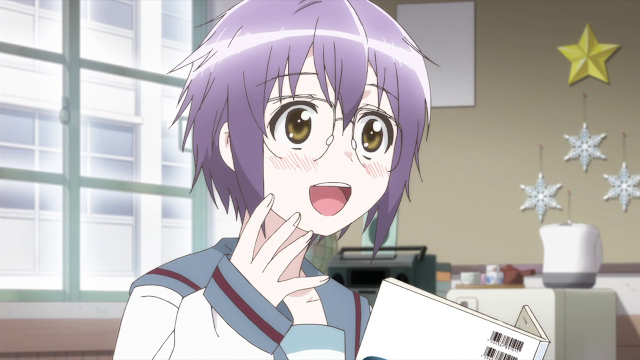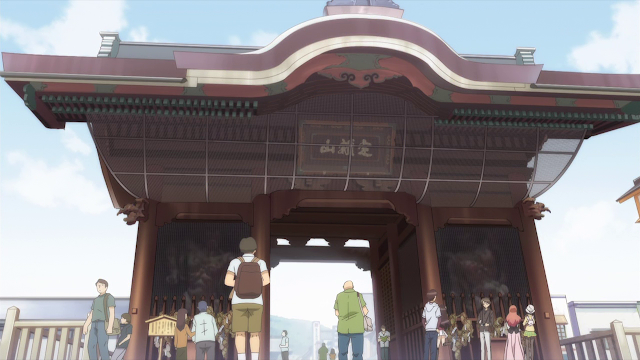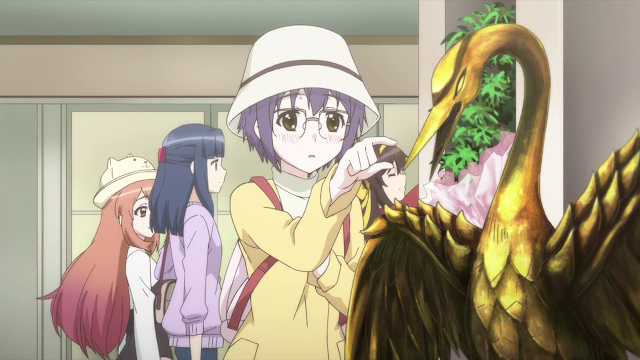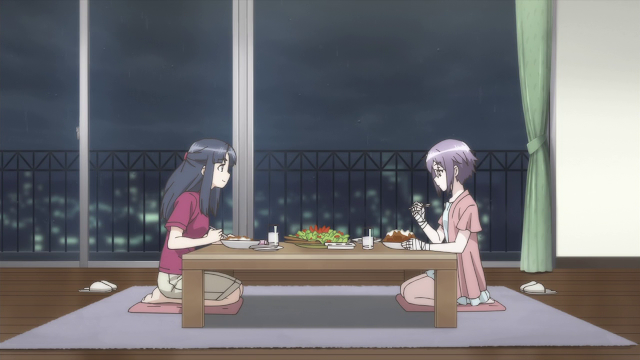“Just when I think I have learned the way to live, life changes.” —Hugh Prather
Rumour has it that The Disappearance of Nagato Yuki-chan might not really have the sixteen episodes; this number was apparently only given by a single source of questionable authority, and the number of Blu-Ray volumes planned is more consistent with a typical twelve episode season. Speaking freely, I’m going to be okay with either: the former will mean more of the story is explored and comes at the expense of more writing, while the latter means that the anime will need to wrap things up smoothly ( this could go either way), but the end result is less writing for me. Since the fifth episode, The Disappearance of Nagato Yuki-chan has taken things at a very slow, relaxed pace, dealing with life at North High as Haruhi and Itsumi join the Literature Club. Naturally, living life at such a languid pace would make for a dull story, and thus, Haruhi proposes a training camp of sorts that sees the Literature Club visit a resort owned by Tsuruya’s family. During this time, Kyon and Yuki grow somewhat closer together, but as the third volume draws to an end, Yuki is very nearly hit by a vehicle; the ensuing trauma alters her personality such that she resembles her Melancholy incarnation in mannerisms and voice. This incident sharply changes the atmosphere in The Disappearance of Nagato Yuki-chan, and sets the stage for the events to occur in the remaining episodes.
Before I delve into my own thoughts on the vacation arc and Yuki’s accident, I’ll take some time to address an issue a fair number of viewers have with The Disappearance of Nagato Yuki-chan: enough remarks and discussions have noted that The Disappearance of Nagato Yuki-chan is a series where the title character does not appear to have a substantial presence. The topic itself is non-trivial, and while some are decrying it as false advertising or other hogwash, the reality is that there is a reason why Yuki seems to be overshadowed by the other characters. This deals primarily with the relationship between Yuki and Kyon: without Ryouko and Haruhi, Yuki and Kyon share numerous quiet moments together, enjoying their time with one another at their own pace. It’s a genuine relationship where both are moving slowly, fluidly and naturally, and to drive this point home, it’s Yuki that Kyon cares about; even with Ryouko and Haruhi stealing the spotlight, Kyon’s attention is nonetheless on Yuki. This demonstrates the strength of Kyon and Yuki’s relationship, given that the external forces exerted by Haruhi and Ryouko do little to keep the two from moving forwards at their own pace. Thus, far from being a detriment to The Disappearance of Nagato Yuki-chan, Yuki’s quiet, minimal presence gives additional weight to Kyon’s interactions with her.
Screenshots and Commentary

- It’s been numerous years since I’ve darkened the hallways of a high school, but my memories of the standardised exams are still fresh. I definitely recall helping my friends study for the standardised exams, although unlike Yuki, my explanations rather make more sense. As a callback to the original Melancholy series, Yuki’s explanations are in the same sped-up dialogue that was used whenever Melancholy Yuki was using incantations.

- Even after the three episode mark, it should be clear that The Disappearance of Nagato Yuki-chan is not intended to be a standalone series for those who are interested in getting into the whole Suzumiya Haruhi franchise. The number of callbacks and subtleties mean that this spin-off is somewhat dependent on having a priori knowledge about the series. Much of the sixth episode is set at North High, depicting everyday life now that Haruhi’s back in the show.

- When a misunderstanding leads Yuki to accept a bite from Kyon, Ryouko goes ballistic. Slow moments like these lead many viewers, many of whom are already familiar with Melancholy, to conclude that the entirety of the anime is not worth watching because “nothing happens”. I counter with the question of what it is that people expect to happen in anime such as these, and then wonder if said individuals live lives that are orders of magnitude more exciting than mine, given that slow-paced slice-of-life anime is what everyday life is on my end.

- Haruhi’s propensity of exacting a penalty fee from Kyon for being late (and deliberately arriving early to do just that) is a clever callback, as well. A year ago, I was planning on travelling on my own this summer, but when my thesis began picking up full steam, I’ve decided to focus on working on my project to the best of my ability; we’re now a month and then some into the summer. Those plans have since been put on hold for the present: I am aiming to submit a paper to a conference next year, and if I’m lucky, it’ll mean being able to travel in Europe.

- Yuki and company end up doing their summer trip in the Nagano region: this is the Nioumon Gate to the Zenkou-ji, a temple built during the seventh century. Located around five hours by train from Nishinomiya, Nagano Prefecture is known for its hot springs and the Japanese macaque. The city of Nagano itself is comparatively small, with a population of “only” 387000, and hosted the 1998 Winter Olympics.

- Yuki enjoys a variety of buns purchased from a local vendor. On my end, as the summer progresses towards the halfway point, the unique food experiences continue to accumulate: last Tuesday, on a cloudy evening, I accompanied friends for freshly-baked savoury pies at a new pie cafe, and tonight, I sat down to a dinner of ribs and Alaska King crab. It looks like the party’s still just getting started, though.

- Here, Mikuru poses with a wooden sword that comes with a built-in face roller. I imagine some would consider me to be closed-minded when I say that the phrase “travel while you’re young” is hogwash: from a personal perspective, it’s better to spend one’s youth (well, twenties) working hard to become financially stable and physically fit. Then, once things settle down, one’d still be fit enough to enjoy travel as much as anyone else, and they’d be able to afford said vacation without taking an unreasonable hit to their pocketbooks.

- Ever since The Melancholy of Suzumiya Haruhi-chan, the crane has been a symbol associated with Tsuruya. In Japanese and Chinese culture, the crane represents longevity and fortune. While it might be a bit of a stretch, it’s quite possible that Tsuruya’s association with cranes could hint at her own unique nature within The Melancholy of Suzumiya Haruhi, where her family is said to have some sort of relationship with Itsuki’s Agency.

- While a fair portion of the eighth episode is spent in the hot springs, I’ve only chosen to include a single screenshot because there’s really nothing noteworthy that happens here, minus the moment that Kyon and Yuki later share with respect to the match-making portal built in for fun.

- Ryouko enjoys a cut of Shinsu beef during an extravagant dinner at the inn; sourced from cattle raised under special conditions. Research suggests that the beef’s unique flavours stems from its oleic acid content and beef marbling standard: Shinsu beef must meet the criterion: 52 percent or more oleic acid and a BMS of eight or higher, 55 percent or more oleic acid and a BMS of seven or higher, and 58 percent or more oleic acid and a BMS of five or higher.

- Some of my friends also introduced me to the Dominion card game a while back, and last time I played, I came quite close to winning my first ever match. It’s proven to be remarkably fun, requiring equal parts strategy, skill and a modicum of luck: in my last game, silvers counted as victory points in the presence of certain cards, and with the silver I had accumulated, I came quite close to victory.

- The spike in landscape quality as The Disappearance of Nagato Yuki-chan wears on is not a consequence of my acclimatisation to the differences between Satelight and KyoAni’s artwork, as a forum-goer had replied when I asked about it. Compared to the simpler, almost more rigid animation and artwork in the earlier episodes, things have improved as the series progressed, with animation being more fluid and landscapes being more detail-rich.

- The inclusion of chibi charcters in some spots are consistent with that of the manga, and act to break the tension in some moments to remind viewers that although this is a romance, it’s also a romance-comedy, in turn relaxing the mood. I also find the characters to be adorable in this format.

- Kyon and Yuki share a moment under a starry sky. The club trip arc thus draws to a close: compared to the manga, some scenes within the anime were added or otherwise extended to provide a better sense of what experiences everyone shared during this trip. By capitalising on the additional dimensions conferred with audio-visual elements, the anime thus captures the fun and chaos that can surround trips with friends in manners that the manga cannot.

- While Yuki was disappointed that she did not draw the lot that would allow her to sit beside Kyon, on the return trip, she spends a calm moment dozing with Kyon. From here on out, Haruhi does not make another appearance, and the The Disappearance of Nagato Yuki-chan returns to the quieter mood the earliest episodes had. This dramatically changes the atmosphere in the anime and allows for the next arc to progress.

- The weather takes on a moody grey with plenty of rain after the camp ends, as Ryouko and Yuki discuss what will lie ahead during the summer. Thus far into June this year, the weather’s been overcast and rainy for a week and two days, respectively, paling in comparison to 2013, during which it rained during the week of my graduation and subsequent weeks, leading to the infamous floods that plagued my province.

- This is the moment that surprised and impressed every viewer who began by watching the anime; reading the manga dissipates the shock rather effectively. The depiction of a Yuki of The Melancholy of Suzumiya Haruhi, complete with Yuki’s trademark monotone voice, in conjunction with the best music heard in The Disappearance of Nagato Yuki-chan thus far, takes the series in a different direction. Naturally, I already know the outcome (having picked up volume four back during late August of 2013), and therefore, will be taking a closer look at how well the anime manages to transcribe those emotions into the animated medium.

- Ryouko expresses frustration owing to being unable to do anything since Yuki’s personality shift. This change had Minori Chihara portray Yuki using the same voice from Melancholy. This was a welcome inclusion and was a nice touch, suggesting that the differences between the two Yukis is sufficient to warrant different voices. I’ve heard some armchair doctors diagnose Yuki with Dissociative Identity Disorder; the lack of good research in the field means that pinning down the cause is difficult, and consequently, I cannot immediately dismiss or accept these claims easily.

- The tenth episode only covers around seventeen pages of volume four; much of the episode is directed towards depicting Kyon’s interactions with the “new” Yuki in a manner reminiscent of “Someday in the Rain” of the original series, although perhaps it might be that I’m missing something, but aside from revealing another side to Haruhi, that episode was not particularly meaningful.

- Ryouko asks Yuki who she is at the episode’s end: given the progression, either two or six more episodes could be used to explore this particular arc further. The next episode will explore the source of Yuki’s unease, and as the final episodes draw near, things are looking to be more serious than most viewers have anticipated; this is why I alluded to the series being more than meets the eye in earlier discussions, and I’m certain that those who dismissed The Disappearance of Nagato Yuki-chan earlier as a “nothing happens” anime are presently eating their words.
Compared to the manga, the anime adaptation draws out the vacation story, making use of the episodes to depict more moods that were only illustrated in the passing. By this point in time, it appears that Satelight’s stepped up their game for The Disappearance of Nagato Yuki-chan, given that the backgrounds and landscapes seem much more detailed than they did with the first episode. For those who are watching The Disappearance of Nagato Yuki-chan without having read the manga, the near-collision was met with quite a bit of surprise, with viewers claiming something like this feels completely out of place in such a casually-paced, relaxed anime. This is the first surprise that I foreshadowed back during the fifth episode discussion; about as unexpected as the Flood showing up to the party halfway through Halo: Combat Evolved, the incident shakes up the status quo and forces Kyon to reconsider how he genuinely feels about Yuki. Meanwhile, Yuki’s new personality, coupled with her old memories, also leave her with conflict about her own feelings for Kyon. These sorts of topics run the risk of being excessively melodramatic, but given what the manga’s done thus far, I imagine that the anime will be able to cover such topics with the finesse to adequately depict the dynamic, turbulent nature of love without overplaying the drama. From what’s been seen insofar, if Yuki’s recovery is indeed how The Disappearance of Nagato Yuki-chan will conclude, it will be a satisfactory ending. Otherwise, if the purported sixteen episodes holds true, then there will be a bit more breathing room to flesh out the fourth volume, and both options are acceptable at this point.




























I call BS on saying she has dissociative identity disorder, as she doesn’t fit the usual pattern at all. She seems to have signs of _dissociation_, which can occur after traumatic experiences and in the severe pathological form can be used to diagnose depersonalization-derealization disorder, which is a kind of distancing from oneself and/or the environment that leads one to consider the environment or oneself to be unreal, to consider the environment or oneself to be “changed,” to not recognize aspects of the self as one’s own, to consider yourself as viewing things outside yourself, among other symptoms. Depersonalization is dissociation that occurs with the self while derealization is dissociation that occurs with the environment. Not recognizing her own memories as her own suggests dissociation. There seem to be other elements of dissociation, as well.
* http://www.mayoclinic.org/diseases-conditions/depersonalization-derealization-disorder/basics/symptoms/con-20033401
“Emotional or physical numbness of your senses or responses to the world around you.”
“A sense that your memories lack emotion, and that they may or may not be your own memories”
“Feeling emotionally disconnected from people you care about, as if you were separated by a glass wall.”
http://www.mayoclinic.org/diseases-conditions/depersonalization-derealization-disorder/basics/causes/con-20033401
Causes: “Severe trauma, such as a car accident”
IMO, Yuki was terrified when that car came at her and detached herself as a defense mechanism. This detachment was clear in how she responded to the driver and Ryoko when they were concerned about her.
LikeLike
I’m no specialist, so I didn’t presume to make a diagnosis here; you’ve got an interesting take on Yuki’s condition.
I’m now curious to hear your thoughts on the change in atmosphere, as well.
LikeLike
I think it’s interesting and a way to explore Yuki’s character and her relationships with her friends Ryoko and Kyon.
One of the most endearing aspects of this series and the Haruhi series is the support Yuki receives. In the Haruhi series, at the end of the Disappearance Yuki really needed support. In Intrigues, when Kyon, Yuki, and Mikuru (small) went back in time to help fix the situation at the end of Disappearance, Intrigues Kyon noted that after she had been changed back to her original humanoid interface self that Disappearance Yuki seemed sad, though he said nothing because he had promised Intrigues Yuki not to say anything to Disappearance Yuki. I agree with Kyon on her having been sad and I think she was sad because her plan had just failed.
Intrigues Yuki takes control of the situation and in some ways seems to support her Disappearance self. Kyon from Disappearance on really supports Yuki and Yuki changes throughout the series. One way she seemed to get better was when Kyon and Yuki discussed the fact that there were others that were in on the Haruhi thing who were not necessarily friendly and Yuki asked Kyon if he was scared, adding that she was not. I thought this moment was heartwarming.
In this series, Yuki receives very strong support from Ryoko and Kyon. I wonder what on God’s green earth Yuki’s parents were thinking having her live on her own, because it’s clear she’s not ready to take care of herself, at least not yet. Ryoko and Kyon are there, so it’s clear things are going to turn out OK for her. I think this thing she’s going through right now where she feels as if she has become a different person is her way of understanding and dealing with the experiences she’s just gone through and is going through, what with the incident with the car and experiencing her memories as if they were not her own. I’m not sure if this was the author’s intent, but he seems well-read and I think the explanation fits. It was a strong moment when Kyon pulled away her bangs revealing the bandage on her forehead; it’s clear things have been very rough for her. I look forward to seeing her fight her way through this and come out on the other end and I don’t think 12 episodes total is enough for the rest of the series!
I look forward to the next episode and think Yuki makes for a very interesting character.
LikeLike
And to clarify, in the Haruhi series, I like the way the support Yuki receives tends to humanize her over time.
LikeLike
And to clarify, I only mention she displays dissociation. I do not know if she would meet the criteria for the diagnosis of depersonalization-derealization disorder. You can have subclinical dissociation.
LikeLike
The series will continue past episode 12.
LikeLiked by 1 person
More writing for me, more episodes for everyone to enjoy. All in all, a good thing 🙂
LikeLike